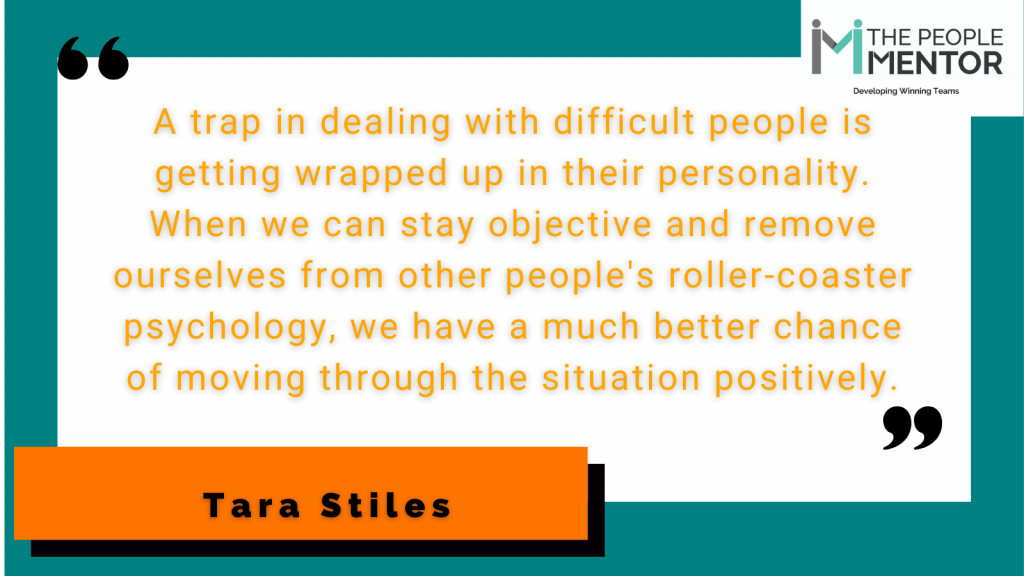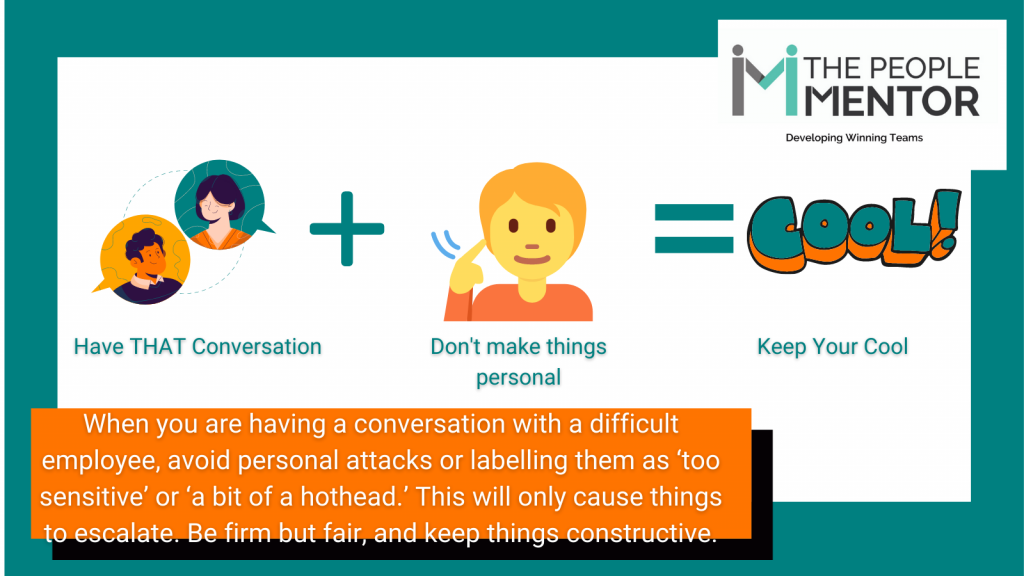When someone is causing conflict or other issues in the office, it can be hard to manage them while keeping your cool. If you’re struggling to manage a difficult person (and manage yourself while you deal with them), here are 9 techniques to help you manage difficult people.

Determine What’s Behind the Behaviour
Sometimes when someone is being difficult, it’s very clear that their behaviour is unacceptable. For example, when a team member is clearly bullying others. However, sometimes it’s not clear, and what you’re seeing could be a clash of personalities or something else you need to drill down on. It’s up to you as a manager to decide what’s acceptable behaviour and what’s not.
Have THAT Conversation
When you have to manage difficult people, you might dread having a conversation with them. Nobody likes having a conversation that they know could end in conflict. But issues need to be dealt with before they become a more serious problem.
Arrange a private conversation with the employee and have an open mind. Maybe they aren’t happy in their job or they feel they aren’t being listened to. Whatever is behind their behaviour or poor performance, use this conversation to get to the bottom of it.
Listen, and clearly and calmly explain that their behaviour or performance has fallen below the standard you expect. Tell them how it’s affecting the team and you, and explain what will happen if things don’t improve.
Be sure to let them know that you are willing to work with them to resolve the issue.
Don’t Try to ‘Win’ the Argument
I recently read a quote that said ‘An argument is about finding out who is right, but a discussion is about finding out what is right.’ When you are trying to manage difficult people, it’s not about who wins the argument. You need to focus on the bigger picture. What needs to happen so you can move past this and deal with the issues?
You want to move forward and grow your business. For that to happen, you need your team members working with you, not against you.
Don’t Make Things Personal
When you are having a conversation with a difficult employee, avoid personal attacks or labelling them as ‘too sensitive’ or ‘a bit of a hothead.’ This will only cause things to escalate. Be firm but fair, and keep things constructive.
Give Constructive Feedback
Speaking of being constructive, when you have to manage difficult people, be aware of how you give them feedback. Being accusatory will only make them feel defensive, for example, “ Everyone is fed up of you not pulling your weight.”
It’s far more constructive and reasonable to relate their behaviour or performance to how it affects the team or the business. For example, “ I’m concerned that your poor attendance is putting pressure on other members of the team.”

Learn to Accept Criticism
During a difficult conversation with an employee, it’s possible that they’ll tell you something that’s hard to hear. This might be their opinion of you or how you do things. Try not to fly off the handle even though you may be tempted. Listen to what they are saying and think about whether their criticism has any truth in it. Tell them that you will always take any constructive feedback on board.
Set Clear Expectations on Performance and Behaviour
This is not just something you should do when you have to manage a difficult employee. Setting out clear expectations on performance and behaviour right from the start means that employees know when they are not meeting the required standards. A Team Charter can help you do this.
Be Patient
Don’t expect things to miraculously improve with a difficult employee overnight. Schedule regular meetings and set milestones to keep a check on their progress and have a two-way conversation. They may need extra support at times.
Ask for Help
If you’re having a real trouble dealing with a difficult person on your team, ask for help. No matter how experienced you are, something will come up that leaves you feeling perplexed. Don’t let overwhelm set in, get the perspective of someone you trust.
As a mentor with leadership and management experience, I can help you.
At some point in your career, you’ll have to manage difficult people. Following these tried and tested tips might just be the difference between keeping your cool and descending into overwhelm!
Book an exploratory call to see how I can help you.
Understanding transactional analysis when having these types of conversations helps. Read more on this
We all want a peaceful life so if you can stop the conflict from happening then that’s even better. Here’s a blog on preventing conflict






